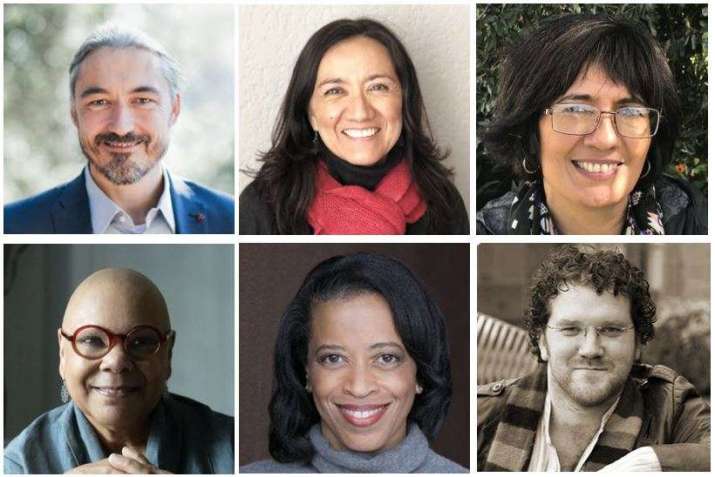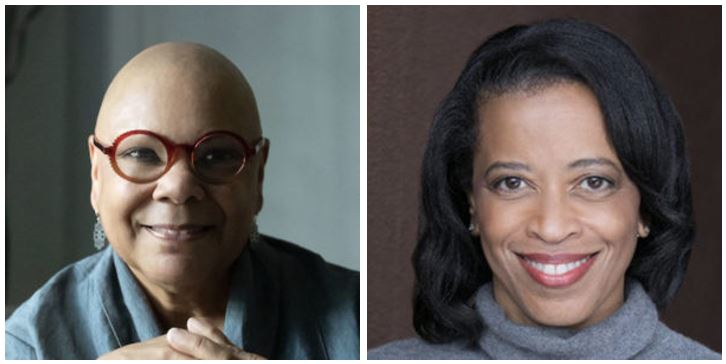NEWS
Collective Trauma Summit Highlights the Healing Power of Contemplative Practices
 Some of the speakers at the Collective Trauma Summit 2020. From collectivetraumasummit.com
Some of the speakers at the Collective Trauma Summit 2020. From collectivetraumasummit.comThe Pocket Project has organized a free online 10-day Collective Trauma summit that aims to address and support the integration of collective and intergenerational trauma. Running from 22 September—1 October, the ongoing event features more than 40 expert speakers from around the world, as well as live music, poetry readings, and healing meditations. Online registration for the free event remains open.
The event kicked off with a live musical performance and a global guided meditation session. Host and collective healing researcher Laura Calderón de La Barca thanked the organizers for moving toward a more culturally diverse seminar attendance, which was noted to be an improvement from previous years.
Organizer and host Thomas Hübl observed that this period of massive upheaval is also a time when humanity is awakening to the effects of collective trauma and wanting to do something about it. Hübl highlighted that the purpose of the event is to come together to address how this could be achieved.
Each day features 4–5 talks that are available for a 48-hour period. Speakers range from researchers and leading psychotherapists to dedicated peacemakers, visionaries, and spiritual teachers. The talks were beautifully interspersed with artistic performances, including healing performances by distinguished Irish poet and meditator Pádraig Ó Tuama and international vocalist and healer Michaela Harrison.
A common theme throughout the event has been the power of spirituality and various meditation and mindfulness-based practices for healing trauma, both for individuals and on a collective level.
Community developer and Màori tribal mentor Thalea Tane spoke of the embedded generational trauma that indigenous people in New Zealand continue to experience as a result of colonization. Her talk included traditional sayings and prayers, as well as a guided breath-based practice to remove agitation and tap into calmness. Tane highlighted that such practices are key to creating a space of collective decision-making.
Speakers Ruth King, left, and Rhonda Magee, right. From collectivetraumasummit.com
Among the numerous speakers are a few who specialize specifically in Buddhist contemplative practices. They include celebrated author and mindfulness teacher Ruth King, as well as professor of law Rhonda Magee. Interviewed separately, they provided a poignant example of what generational trauma looks like, as they individually described the hardships experienced by Americans of African descent, and particularly the ways in which their grandmothers worried for the safety of their descendants in a country that privileges white people at the expense of communities of color.
“For me, part of what is at the root of my work to bring mindfulness to the world,” said Magee, “is being really kind of in awe of the way that awareness practices, compassionate practices—of a variety of sorts—have always been at the root of movements for deep change in the world and have helped us understand the multidimensional ways of what it takes to really participate in making the world better.”
As Magee shared that she and a handful of others in the legal sector are attempting to mindfully dismantle a system that was built to serve white supremacy—and that continues to perpetuate harm—she spoke of her grandmother’s resilience when it came to “making a way out of no way.”
This saying was pinpointed by Kosha Joubert, CEO of the Pocket Project, as being particularly relevant to the current challenges so many communities are facing. Joubert noted that this period in time is rife with hopelessness, and this attitude of “making a way out of no way” can be an inspiration to people struggling with the collective traumas of racial distress, the current global health crisis, and rapid environmental decline.
The ongoing summit will feature an array of talks and performances on the topic of trauma and healing until Thursday.
See more
Related news from Buddhistdoor Global
Barre Center for Buddhist Studies Hosts Family Members and Survivors of Gun Violence
Yongey Mingyur Rinpoche: Science Shows Meditation Can Improve Our Quality of Life
Trauma and the Vagus Nerve: When Mindfulness is Not Enough
Los Angeles Buddhists Perform Silent Meditation Walk in Solidarity with Anti-Racism Activists
US Buddhists Call for a United Stand Against Injustice and Suffering
Dalai Lama Decries “Racism, Discrimination” Behind the Killing of George Floyd
American Buddhist Women — On Race and Politics















